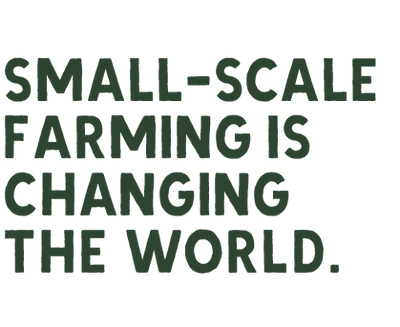Written by Tracey Lindeman
Being a farmer is hard work. Our tools don’t have to make it harder. In fact, as ancient and Indigenous civilizations have taught us, the tools that help us to farm are extensions of the kinds of farming we long to do. That’s why the craftsmanship renaissance for farming tools couldn’t come at a better time.
***
The industrialization of agriculture and globalization of supply chains in the 1900s may have disconnected us from the need to invest in human-centered tools. The more recent movement, however, toward market gardening and urban farming, lays the groundwork for a re-examination of how we farm.

“Unlike on farms that use heavy machinery, our bodies are actually tools themselves,” says Jean-Martin Fortier, who’s been farming without tractors for almost 20 years. “We need to make sure that the equipment we use serves the ergonomics of our bodies.”

Tools have been Benoit Thivierge’s life, ever since he was a kid hanging out in his father Clovis’s lawnmower and chainsaw repair shop. Before the 1990s, the shop, in a rural community about 100 kilometres east of Montreal, was also one of the few BCS two-wheel tractor dealers in eastern Canada. As more market gardens were popping up, Benoit just couldn’t ever get the highly sought after power harrow, a low tillage surface cultivation BCS attachment, that growers wanted.
Tired of being back ordered, Benoit and his brother Martin, a welder, started making a version themselves. That’s how Les Équipements Thivierge became the first North American manufacturer to sell BCS equipment on the continent. It snowballed from there, with Benoit and Martin designing and manufacturing custom-made tools for growers whenever the tools that were already available on the market just wouldn’t suffice. “Feeling useful to our community is a nice reward,” says Benoit. That’s also why Jean-Martin Fortier asked Benoit to help him design and produce the line of tools for Growers & Co.

This is an incredibly niche market with high overhead and slim margins, which is why there are still so few craftspeople. If you're looking elsewhere, Two Bad Cats in Vermont, Farmers Friend in Tennessee and Modern Grower are a few other options. For the people who use these tools day in and day out, though, they are major difference-makers.
The symbiotic relationship between tools and farming has inspired a new wave of tool-making in small-scale agriculture. But the crossover effects don’t end there for Benoit. He’s learning now, more than ever before, how quality tools can make a difference to farmers.



